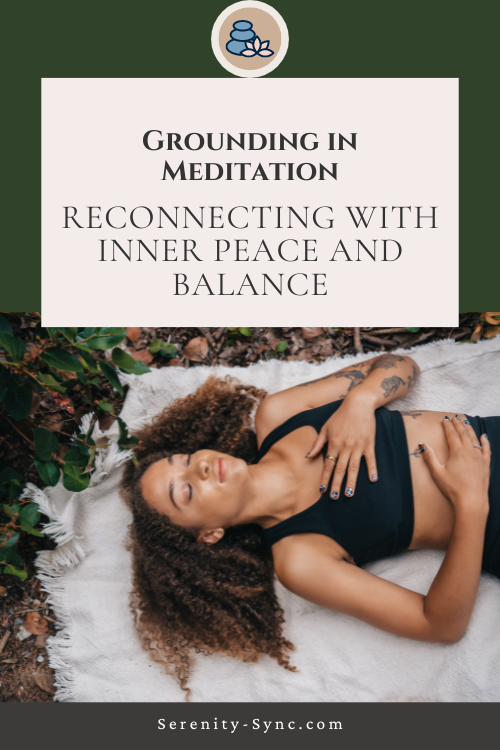In Brief
Grounding in meditation is a powerful technique that allows individuals to reconnect with themselves and find inner calm and balance. By establishing a physical connection with their bodies and the environment, people can detach from distractions and be fully present in the moment. This practice is especially beneficial during times of stress, overwhelm, or disconnection, as it helps rebalance the mind and bring stability and focus. In this blog post, we will explore the different aspects of grounding in meditation, including its definition, techniques, importance, scientific studies, and tips for incorporating it into daily life. By incorporating grounding practices into your routine, you can experience a sense of rootedness and stability, enabling you to live a more present and focused life.

Your Free PDF version of this blog post Awaits – No Strings, Just Click and Enjoy! 🌸🎁
Introduction
Some people naturally wake up with a sense of calm and focus. These lucky individuals seem to effortlessly navigate through life, undeterred by stress or distractions. But let’s be honest, most of us aren’t born with this innate ability. We have to work on achieving inner calm and balance. And that’s where grounding in meditation comes in.
Grounding in meditation is like pressing the reset button for your mind and body. It’s a technique that allows you to reconnect with your core and find that elusive sense of peace and balance. By establishing a physical connection with yourself and the environment, you can detach from the chaos of everyday life and be fully present in the moment. It’s like plugging yourself back into the source of your being, recharging your mental and emotional batteries.
In this blog post, we’ll dive deep into the world of grounding in meditation. We’ll explore what it is, why it’s important, and how you can incorporate it into your daily life. So, get ready to reconnect with your inner peace and balance!
What is Grounding?
Grounding is all about reconnecting with our core and sense of self. It’s about establishing a physical connection with the environment and grounding ourselves in the present moment. It’s like coming home to ourselves, finding stability and balance in a world that often feels chaotic and overwhelming.
When we ground ourselves, we tap into the Earth’s energy and align ourselves with its natural rhythms. It’s like plugging into a power source that replenishes our mental, emotional, and physical well-being. This connection with the Earth helps us feel more centered, stable, and grounded.
Imagine yourself as a tree, deeply rooted in the ground. No matter how strong the wind blows or how turbulent the storms may be, you remain steadfast and unwavering. That’s the power of grounding.
Fun Fact
Grounding can be as simple as walking barefoot on grass or sand. This not only allows you to connect with the Earth’s energy but also provides a natural massage for your feet, stimulating various pressure points and promoting overall wellness.
Grounding Meditation Techniques
Spending time with oneself
One of the key techniques in grounding meditation is spending time with oneself. This involves intentionally carving out time in your day to be alone and fully present in the moment. Here are some techniques you can use to stay aware of your surroundings:
- Using the five senses: Engage your senses to bring yourself back to reality. Focus on what you see, hear, smell, taste, and touch. This helps ground you in the present moment and prevents your mind from wandering.
- Bringing oneself back to reality: Our minds have a tendency to wander, especially during times of stress or overwhelm. Grounding meditation helps bring us back to reality and prevents us from getting lost in our thoughts. Use techniques like deep breathing or body scans to anchor yourself in the present moment.
- Mindfulness activities for grounding: Engage in activities that promote mindfulness, such as yoga, walking in nature, or journaling. These activities help you become more attuned to your body and surroundings, fostering a sense of grounding and presence.
Focusing on physical and emotional reconnection
In addition to spending time with oneself, grounding meditation also involves focusing on physical and emotional reconnection. Here are some techniques for managing stress and overwhelm:
- Techniques for managing stress and overwhelm: Grounding meditation provides a toolbox of techniques to help manage stress and overwhelm. These techniques may include deep breathing exercises, progressive muscle relaxation, or guided visualizations. Experiment with different techniques to find what works best for you.
- Cultivating a sense of inner peace and balance: Grounding in meditation allows us to cultivate a sense of inner peace and balance. By connecting with ourselves and the present moment, we can let go of external pressures and find a sense of calm within. This inner peace radiates outward, positively impacting our relationships and overall well-being.
- Navigating painful memories and grief: Grounding meditation can also help us navigate painful memories and grief. By grounding ourselves in the present moment, we can acknowledge and process these emotions in a safe and supportive way. This process allows healing to occur, leading to greater emotional well-being.
Importance of Grounding
Grounding in meditation is not just a trendy practice; it holds significant importance in our modern lives. Here are a few reasons why grounding is essential:
Helps in times of distraction, stress, or feeling out of sorts
Life can be overwhelming at times. We juggle multiple responsibilities, face constant distractions, and experience stress from various sources. Grounding in meditation provides a refuge from the chaos. It helps us find stability and balance when we feel scattered or out of sorts. By grounding ourselves, we can detach from distractions and focus on what truly matters.
Prepares us for focused events and enhances mental clarity
Have you ever felt scattered or unable to concentrate before an important event or task? Grounding in meditation can help. By establishing a connection with ourselves and the present moment, we prepare our minds for focused events. Grounding enhances mental clarity and allows us to approach tasks with a calm and centered mindset.
Assists individuals with PTSD or dissociative disorders
Grounding in meditation has been found to be particularly beneficial for individuals with PTSD or dissociative disorders. These individuals often experience a disconnection from their bodies and struggle with overwhelming emotions. Grounding techniques help them reconnect with their physical bodies and create a sense of safety and stability. It provides a grounding anchor during moments of distress and helps them navigate their emotions in a healthier way.
Scientific Studies on Grounding
Scientific studies have provided evidence supporting the benefits of grounding in meditation. Research has shown that grounding can have a positive impact on both physical and mental health.
Studies have found that grounding techniques, such as walking barefoot on grass or sand, can reduce inflammation in the body. Chronic inflammation is linked to various health conditions, including heart disease, diabetes, and autoimmune disorders. By grounding ourselves, we can potentially reduce the risk of these conditions and promote overall health.
In addition to reducing inflammation, grounding has been found to improve sleep quality. Sleep is essential for physical and mental well-being, and poor sleep is associated with an increased risk of various health problems. Grounding helps to regulate the body’s circadian rhythm and promotes a deeper, more restful sleep.
Furthermore, grounding has been shown to enhance mood and reduce symptoms of anxiety and depression. By reconnecting with ourselves and the present moment, we can release stress and cultivate a greater sense of emotional well-being.
Overall, scientific studies provide evidence that grounding in meditation has tangible benefits for our physical and mental health. By incorporating grounding techniques into our daily lives, we can improve our overall well-being and live a more balanced and fulfilling life.
Tips for Incorporating Grounding into Daily Life
Incorporating grounding into daily life is easier than you might think. Here are some practical tips to help you bring grounding practices into your routine:
Spending time in nature: Nature is a powerful grounding force. Take regular walks in the park, sit by a tree, or spend time gardening. Connecting with the natural world helps us feel more grounded and connected.
Using grounding mats or sheets: Grounding mats or sheets are designed to mimic the earth’s energy and can be used indoors. Simply place the mat or sheet on your bed or under your desk and let it help you connect with the earth’s energy.
Practicing mindfulness while grounding: As you engage in grounding activities, bring your full attention to the present moment. Notice the sensations in your body, the sounds around you, and the feeling of your feet touching the ground. Mindfulness enhances the grounding experience and helps anchor your attention in the present.
Remember, grounding is a personal practice, and what works for one person may not work for another. Explore different techniques and find what resonates with you. The key is to incorporate grounding practices into your daily routine, allowing them to become a natural part of your life.
Conclusion
Grounding in meditation is a powerful practice that allows us to reconnect with ourselves and find inner peace and balance. By establishing a physical connection with our bodies and the environment, we can detach from distractions and be fully present in the moment. Scientific studies have shown that grounding can have numerous benefits, including reducing inflammation, improving sleep quality, and enhancing mood. By incorporating grounding techniques into our daily lives, such as spending time in nature or using grounding mats, we can experience a sense of rootedness and stability. Grounding helps us navigate the challenges of life with greater clarity and resilience, promoting overall well-being. So why not give it a try? Take a moment to ground yourself and reconnect with the present moment. You might be surprised by the peace and balance you find within.
Fun Fact
The concept of grounding has been around for centuries and is deeply rooted in ancient practices such as yoga and meditation. It has stood the test of time and continues to be a valuable tool for finding balance and peace in the modern world.


1 thought on “Grounding in Meditation: Reconnecting with Inner Peace and Balance”